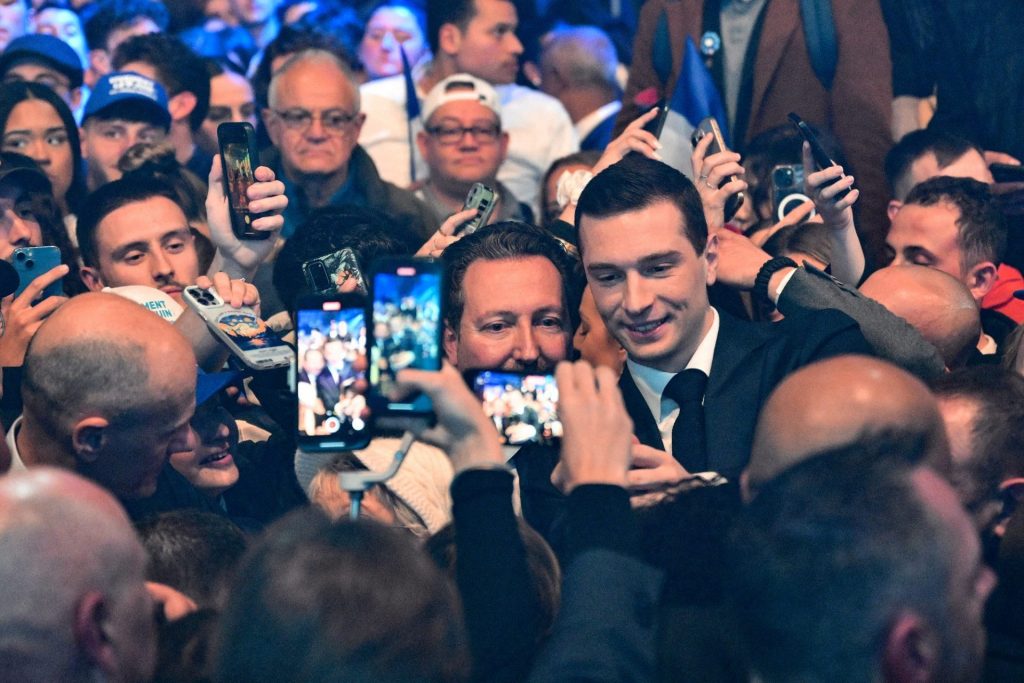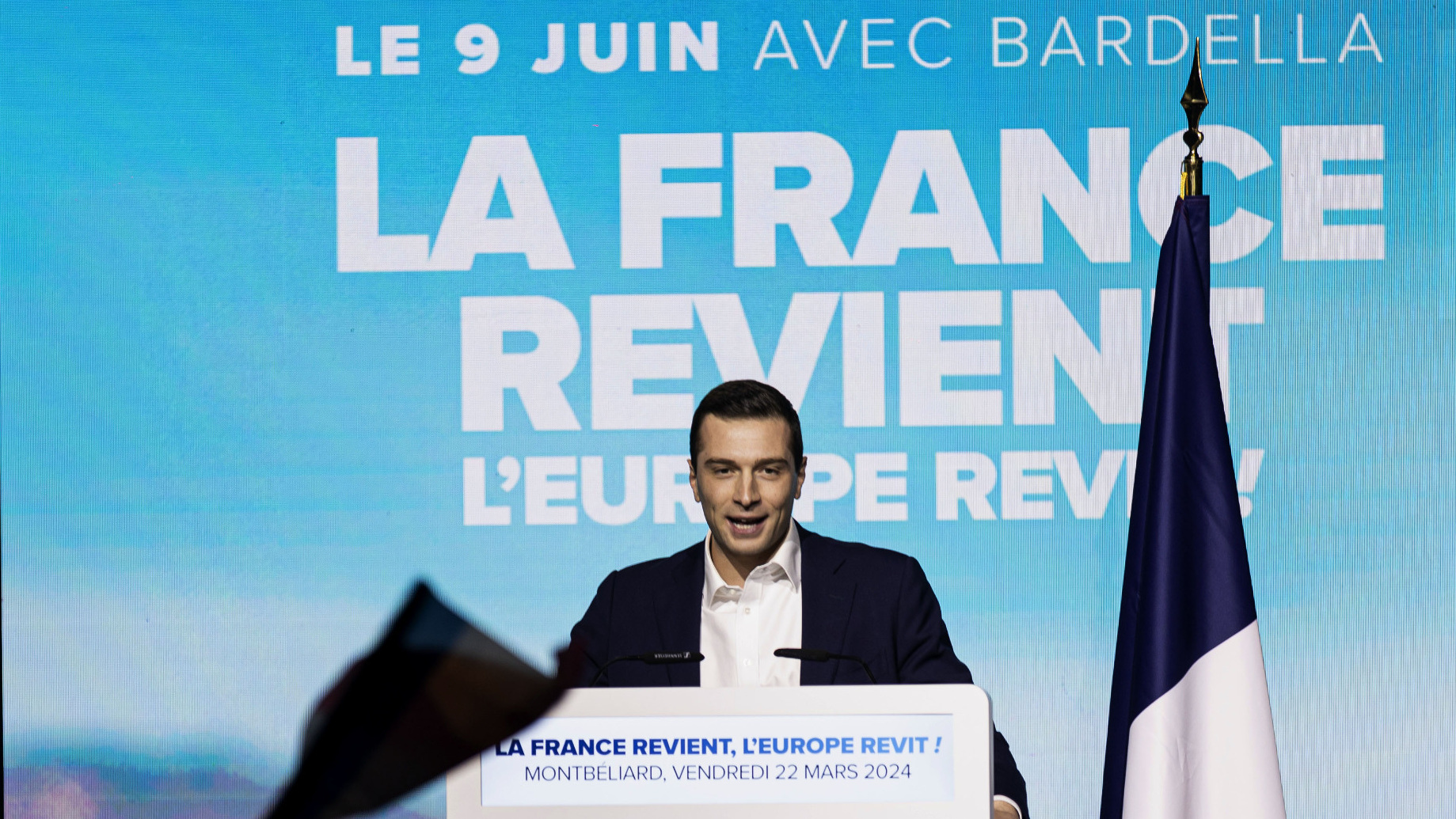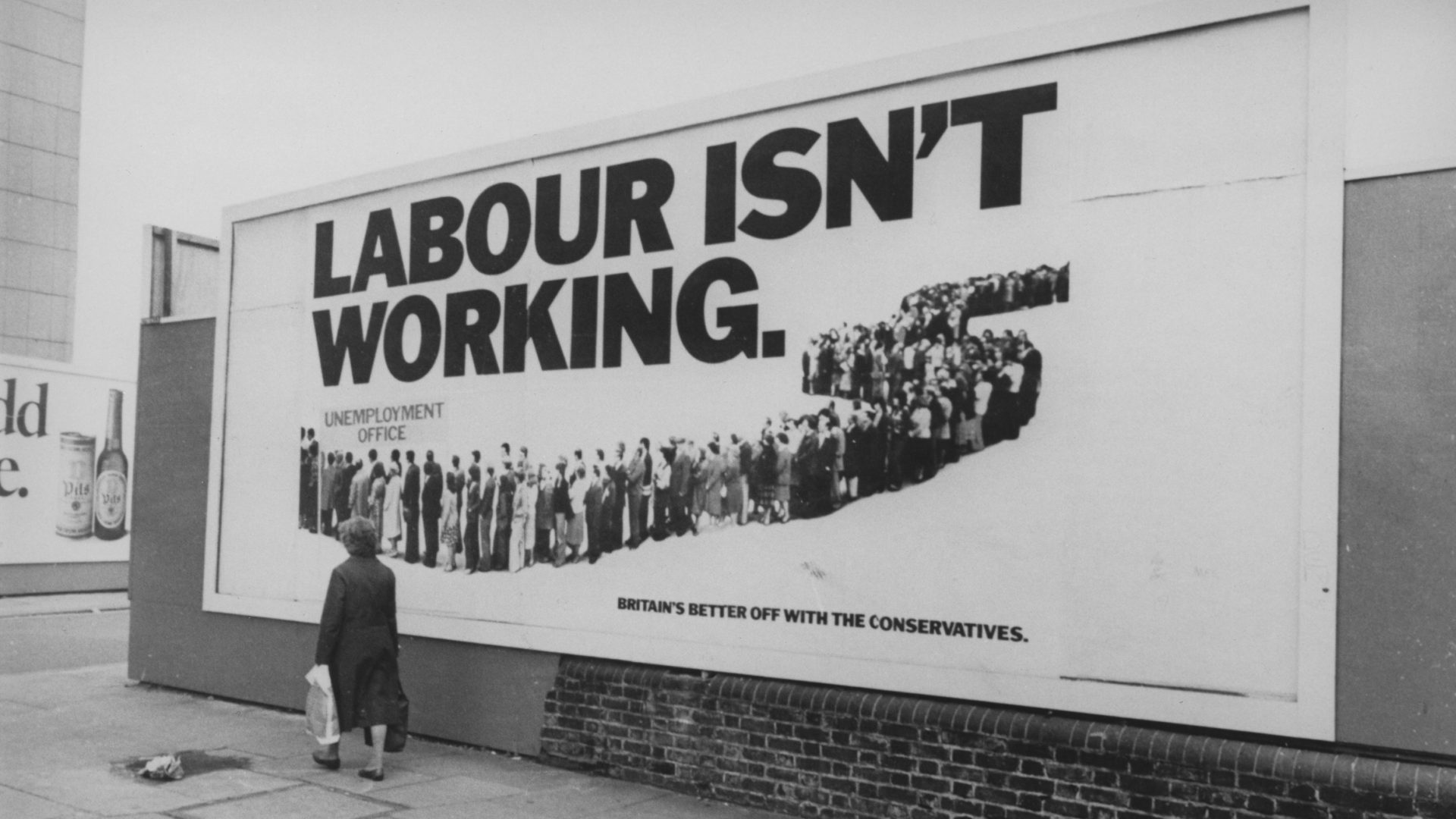That’s not a candidate, it’s a phenomenon. Jordan Bardella, the Rassemblement National’s lead candidate in the European elections on June 9, is the new face of a reshaped and smoothed-out far right.
He wears a white shirt and black tie, has well-combed hair and a white-toothed smile and displays unfailing courtesy. He is the product of well-learned lessons recited in such a way as to have an answer for everything without saying much, while taking care not to divide too much.
At meetings and markets, he is greeted like a rock star. “Jordan! Jordan!” He is more than just Bardella, he’s Bardellamania.
A handsome young man, he’s the perfect candidate for a populist nationalist party.
He was raised on a council estate in Seine-Saint-Denis, a working-class suburb north of Paris. An only child of Italian descent on his father’s side and Algerian on his mother’s, he built his myth of a poor and deserving child by avoiding mention of his schooling at a private Catholic establishment.
He’s been in a relationship with one of Jean-Marie Le Pen’s granddaughters – Marine’s niece and Marion’s cousin – which has not harmed his political rise.
Jordan Bardella’s ascent now seems less and less resistible. With a week to go to the European elections, the polls are all pointing to a landslide victory for the party formerly known as the National Front.
A poll by Institut français d’opinion publique (IFOP) on May 22 put Bardella’s list of candidates on 32.5%. By contrast, the Renaissance (and allies) coalition list led by Valérie Hayer and backed by president Emmanuel Macron is a distant second at 16%, closely followed by Raphaël Glucksmann’s Parti Socialiste/Place Publique at 15%.
Manon Aubry’s France insoumise, François-Xavier Bellamy’s Républicains, Marie Toussaint’s Europe Ecologie Les Verts (6.5%) and Marion Maréchal’s Reconquête (6%) are close behind.
Even before the poll, Macron knew he had to bring out the heavy artillery. In an attempt to halt the momentum of this infernal machine, the president of the Republic surprisingly asked his prime minister, Gabriel Attal, to take on Le Pen’s favourite in a head-to-head debate that was as eagerly awaited as it was controversial, organised on public television on Thursday, May 23.
The debate caused a scandal. The prime minister’s presence was in itself an anomaly. He is neither the head of the list nor a candidate.
The job of debating Bardella should really have gone to Valérie Hayer, the head of the “Need for Europe” list. She is admittedly not a celebrity, and doesn’t wow the crowds – but it is she who leads the list of the president’s coalition. Her replacement at this key moment, even if she had been outshone by Bardella in an earlier debate, gave off a slight whiff of misogyny.
The other candidates were obviously outraged at seeing the European elections reduced to a face-to-face meeting as if they didn’t exist, making the debate resemble a second round of the presidential election head-to-heads.
Attal himself was reluctant to take part. Wasn’t it paying Bardella too much of a compliment to pit him against France’s prime minister? Wasn’t that tantamount to legitimising him?
From the start of the debate, the younger Bardella made sure to mention his opponent’s title, “the prime minister”, emphasising both words.
Bardella, an MEP and also a councillor in the Île-de-France region, thus found himself debating far right nationalist talking points on an equal footing with the second most important figure in the French state.
And they were dressed exactly alike. Same suit, same tie, and almost the same age: Bardella 28, Attal 34. Behind the impassive face of the challenger, the subliminal message was clear: “We’ll meet again one day. And I’ll be in your shoes”.

Photo: Christophe Simon/AFP/Getty
Until now, Bardella had deployed a strategy of evasion. He has shunned the first three televised debates with the other candidates on flimsy pretexts.
He’s right: why not say as little as possible, if it means avoiding problems? Bardellamania works all the better because the candidate does not talk in detail about his plans for Europe, especially as they are not very clear. The arrows thrown at him by his political opponents and media interviewers are like knives in water.
“Bardella sucks. He’s nothing but a vacuum,” says the president’s entourage. Macron needs to put an end to the myth of this upstart, invincible man. The Elysée Palace wants to believe that all they have to do is expose Bardella to scrutiny and the voters will run a mile.
That’s why Attal got into the ring, despite his misgivings. By sending his brilliant prime minister to the front, president Macron pulled out and played his best card. This was a risky move: unfortunately, that best card was also Macron’s last card. What if it failed?
Objectively, rationally, Attal pulverised Bardella. At the end of the debate, which attracted 3.6 million viewers, or 18% of the public, the victor seemed clear.
The prime minister, who arrived empty-handed, debated for almost an hour and a half without a single sheet of paper in front of him, while his opponent constantly dipped his nose into his files. Smiling good-naturedly, Attal dismantled his opponent’s arguments, even on his cherished theme of tougher immigration controls, simply by asking him to explain how things would work in practice.
Bardella wants a law that says French government contracts have to be offered to French companies. Attal responded that this was a policy first advocated by Jean-Marie Le Pen – Marine’s father; now regarded as the unacceptable face of the extreme right. And, he pointed out, if France took the step, “other European countries will do exactly the same and our companies will lose contracts.”
Bardella wants a “double border”, both European and national, “like they have at airports”. Attal let him talk about border crossings between France and Spain or France and Germany, that under his plan would resemble the infamous queues at Charles de Gaulle airport.
Another vexed subject was leaving the EU. The Rassemblement National has made so many twists and turns on “Frexit” it makes you dizzy.
Marine Le Pen loudly celebrated Brexit. She put up a British flag in her office and clearly stated that she wanted to leave both the European Union and the euro.
Since the calamitous example of the United Kingdom, there has been no more talk of this. Bardella now asserts that his party never wanted to leave the European Union in the first place.
Attal said: “Why were you for leaving the euro, and now you supposedly want to stay in the euro? Why were you for leaving the EU, and now you supposedly want to stay in the EU? When did you lie? Was it at the time or is it today?” His opponent was on the ropes from start to finish.
At the Renaissance Party HQ, where the prime minister turned up by surprise straight after the debate, the mood was one of celebration. “You slaughtered him!” Valérie Hayer said as she congratulated Attal. She later tweeted that the PM had shown up Bardella’s “incompetence, his lies, his posturing.”
The modest aim of the presidential majority coalition that Hayer leads is now to get closer to the 20% mark by banking on the popular figure of the prime minister. Half a million copies of a new leaflet featuring Attal were distributed over the weekend.
Rationally, then, Attal knocked out Bardella. But what does being rational matter when you are up against Bardellamania?
Jordan Bardella doesn’t need a programme – he’s a phenomenon. He is not presenting a project, he is proposing an anti-Macron referendum. His themes are not European, they are national.
His ambition is not in Brussels, it is in Paris, to become prime minister or president of the Republic. He doesn’t need to win a debate, he’s a star on social networks and particularly on Tiktok where he’s very active, to the delight of his million young followers.
The post-debate polls bear this out. According to a survey by pollsters Odoxa-Backbone for Le Figaro, Bardella won by a narrow margin overall – 51% of French people who watched the debate found Bardella more convincing, compared with 46% for Attal.
Bardella was considered to have been the winner of each of the eight major areas of policy discussed, including the ones in which he was humiliated. He even won on the subject of nuclear energy, on which the Rassemblement National, once again, keeps changing its mind.
A post-debate Ipsos poll is also enlightening. Attal was judged “more competent” by 33% compared to 25%. But when asked “Who has a clear vision for the country?”, Bardella won with 32% against 25%. Who is closest to the concerns of the French people? 37% for Bardella, 21% for Attal. When it came to “Who is capable of changing things?” Bardella got 34%, Attal 21%.
That’s the key: change things! This is at the heart of what drives populism: the false promise to throw out the old system to make way for a rosy, radiant future. There’s no way of getting there, but we want to believe in it anyway.
Those who have witnessed the United Kingdom’s Brexit close-up are well-placed to know this. So are those who tracked Donald Trump’s reign as president of the United States.
As a veteran Republican strategist wrote in the New York Times about Trump: “This is not about him. It is about who he is there to stop. He was elected to be the hand grenade underneath the establishment’s door.” The French no longer vote for a manifesto. They vote because they can’t stand the other parties any more.
Populism doesn’t bother with the truth. It thrives on attitudes and impressions. Demonstrating incompetence doesn’t change anything because the facts don’t matter.
Attal had mastered all the issues and demonstrated Bardella’s false promises: but he was wrong to be so right. Attal was surprised that Bardella had quietly admitted that he hadn’t read the text on the reform of the European electricity market before voting against it in parliament. This apparent victory turned out to be viewed as a defeat for Attal, who was seen as smug. His opponent, who was wrong, was seen as right to show magnificent composure.
Both opponents were calm and smiling. The smile of the winner, Attal, was seen as an expression of arrogant superiority. Bardella’s smile was seen as polite. And that’s how the loser wins.
Macron has now tried to play yet another card: himself. Even though the debate between Attal and Bardella was denounced by all the other candidates as a distortion of democracy, Macron has proposed a head-to-head debate between himself and Marine Le Pen.
This will be the fatal weapon, the president reckons, as if he is refusing to see that the elections are precisely a referendum on him and that his mere presence feeds his opponents.
Le Pen, for her part, said that she would be “delighted” to debate with Macron provided that he “puts his resignation or the dissolution of the National Assembly on the table” after the European elections. “Le Pen is afraid!” the Elysée leaked in reply.
Le Pen didn’t seem to care. Instead she promised Jordan Bardella that when she won the presidency in 2027, he would be her prime minister.




